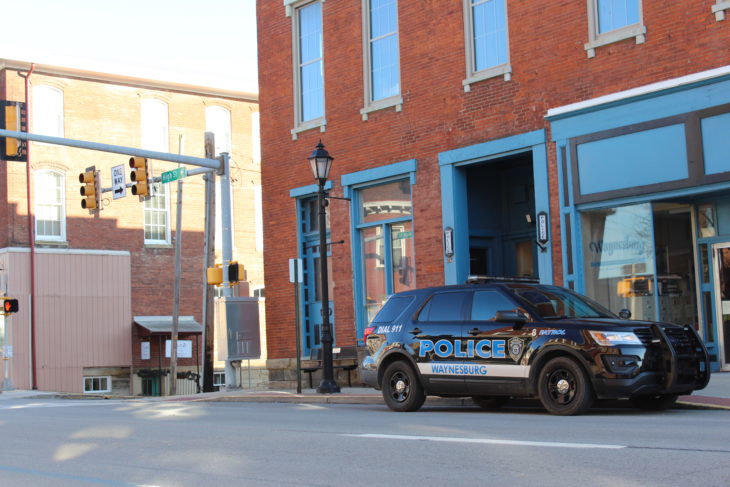 Edward Boice, The Yellow Jacket
Edward Boice, The Yellow Jacket Since the beginning of 2020, the Waynesburg Borough Police Department has increased traffic enforcement in the Waynesburg area.
“It’s been productive all the way around,” Police Chief Tom Ankrom said, “making the stops on people and seeing what’s going on. Just trying to eliminate problems — one being the traffic, and two being the drug issues we deal with.”
Although Ankrom is unsure if additional enforcement is the cause, the number of vehicle accidents has decreased since its implementation. Sergeant Shawn Wood said he expects the numbers to stay down, but acknowledges that “correlation does not mean causation.”
“We probably average about 10-12 crashes a month, roughly. It’s over 100 a year, somewhere around 100 and 120,” Ankrom said. “By enforcing the speed more, that number from the first month was three.”
Wood said when the department first initiated the increase of traffic enforcement, there was a spike in speed violations.
“Our numbers initially went up in reference to violations for speeding, but it seems like they plateaued now,” Wood said. “People are now coming into town not as fast as they used to.”
The speed limit on East High Street and Greene Street is 25 mph.
While they have been patrolling more, Ankrom said that officers are not giving out speeding tickets to every person they pull over. Wood said he has not changed his judgment with ticketing.
“[Officers] don’t need to cite everybody,” he said. “Pulling over an 80-year-old woman who’s going to church on a Sunday morning, she probably doesn’t need a ticket. Just telling her to slow down will probably work. So the officers have discretion on how they’re dealing with things.”
Most police stops occur during the day, explained Ankrom and Wood. Ankrom said the most violations usually occur between 5-8 a.m.
“There’s less traffic on the roads, but there’s less parking on the sides [at that time], and that’s when people are coming into town fast,” Wood said.
Ankrom said he wanted increased traffic enforcement ever since he entered the role of police chief in August 2019. After discussions with the department officers, he decided more enforcement was needed.
“I try to use their opinion on what needs done and then base my decision on what they tell me,” Ankrom said.
Wood and Ankrom said they believe the increase in traffic enforcement will make roads safer in the long term. Both explained that this type of enforcement helps in preventing problems more consequential than speeding, such as crashes and theft.
“I think that because you enforce that kind of stuff, it cuts down on [other violations] you would have had,” Ankrom said. “For example, if we start being proactive with drug issues, if you get them [with traffic enforcement], then you may avoid burglaries and thefts you would have had with the same people.”
